SWAT: Global Strike Team
Kristan wouldn't hurt a fly. Terrorists, on the other hand...
Keeping games interesting and frustration free is no easy task, and many a promising game has been stopped in its tracks by sudden spikes in the difficulty level that have us inventing new and interesting swear words on a daily basis. Sometimes the game is so good you plough through those multiple restarts, and curse as hours of your life are lost to often hatefully exacting design. Often, though, it's a showstopper, and you spare yourself the high blood pressure by hitting the eject button and moving onto something more fun.
On the other hand, what's the point of making a game so forgiving that you can just breeze through most of the levels in ten minutes on your first go? With barely a challenge in sight, SWAT manages to scoop the accolade of being - by some margin - the easiest first person shooter I've ever played. Playing it on the default Veteran level, all 21 levels were conquered in just over six hours. Out of that, I scooped 19 grade As and 2 grade Bs, and completed the majority of the levels on my first play through, not even using a continue. And this coming from a gamer accused of not being that good at games on occasion. Pah. Either I've just become a ninja gamer overnight, or SWAT's got some serious design issues.
SWAT's new?
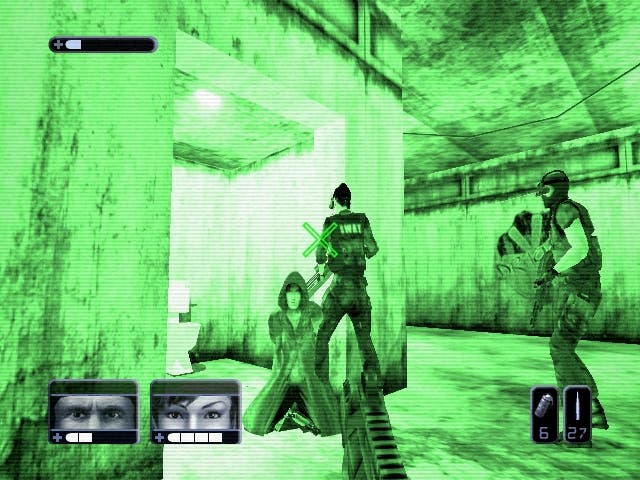
It's a shame it's so painfully easy, because the potential is there for SWAT to be an absolutely corking game with great buddy AI, voice recognition, a superb weapons upgrade system, wonderful reward mechanics, excellent controls and a good atmosphere. Somehow, despite the lightning pace with which you can rip through the levels, there are enough well-implemented new ideas to make it an enjoyable experience throughout.
The premise is that you're controlling TAC-3, a three strong law enforcement team comprised of elite officers on a mission to destroy two warring narco-terrorist organisations. In the main you control the Justin Trousersnake look-alike leader Mathias Kincaid, but the game also switches to the sharpshooter Kana Lee for the occasional sniping mission, while field technician Anthony Jackson helps out with his ability to hack into seemingly any known piece of electronics, including bombs, doors, and surveillance systems. Handy.
In the context of SWAT, this translates into a law enforcement take on the FPS genre; entering everyday environments via often unconventional means, taking down criminals, rescuing hostages and generally saving the world from the menace of evil men. Unlike most FPSs, it's not just a case of kill kill kill and then move onto the next level. Refreshingly, Argonaut has devised a series of incentives to take care over who you shoot, where you shoot them, and what you shoot them with.
Take them down
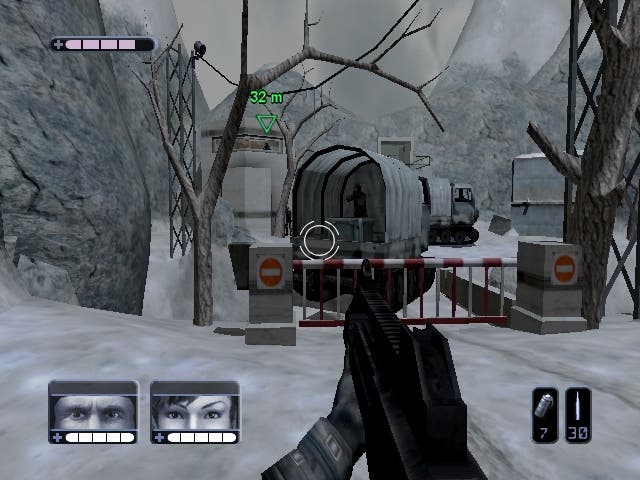
Obviously your main concern is your own safety, so killing suspects is always your first instinct, but there are a number of ways of dealing with perps without merely loading them up with lead, and the game rewards you for doing so. The main priority is to locate and take down the prime suspects populating each level without causing death. There's no punishment for killing them as such, but you'll miss out on being able to upgrade your main weapons, and that would be foolish.
Naturally, you can't just expect an enemy firing wildly in your direction will give up that easily, so part of the fun is working out the best way to bag them. Without a doubt, the easiest way is to scare them into compliance, either by merely shouting "SWAT! Drop your weapon!" when they have their back to you, or firing above their head, while raking them with tranquilliser bullets eventually sends them crashing to the floor, allowing you to cuff them. Shooting them with anything else can cause death if you're not careful, but sometimes it's unavoidable if you're on your last block of health.
Each prime suspect captured alive gains you an upgrade point, and various elements of your weapon can be improved at the start of each level, such as the ammo capacity, recoil rate, scope, and damage, which allows the game to power up your arsenal in a far more elegant way than just throwing more weapons at you. Equally well thought out is the way you have to choose your weapon at the start of every level, with the choice of Assault Rifle, Machine Gun and Shotgun, with a pistol as standard, and also the choice of three different types of grenade.
No cheats allowed
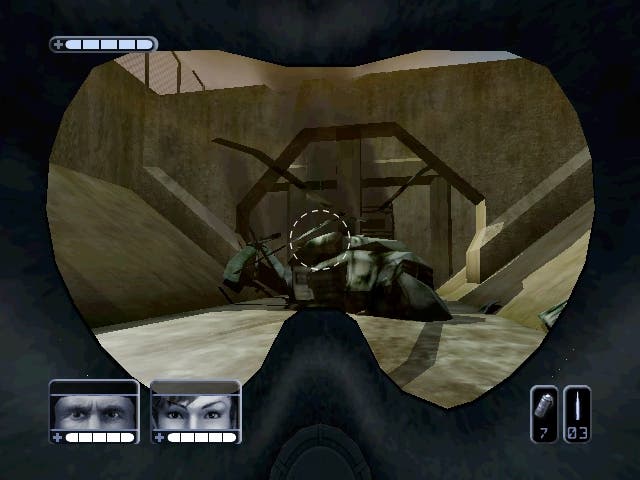
However, while the use of non-lethal force is something SWAT rewards heavily, there are several other medals and awards to play for including melee attacks, headshots, not being hit at all or not using any continues. In the case of the latter, SWAT offers checkpoints and continues, but no saves, so you're forced to play with a degree of care and discipline which other FPSs would do well to emulate, rather than offering the ruinous quicksave game killer.
Argonaut has also neatly dispensed with the stupidly unrealistic health/medipack dynamic present ever since the days of Wolfenstein 3D, instead giving the player five bars of health and no means of arbitrarily patching yourself up. Bizarrely, however, occasional mid-level cut-scenes often have you returning to the action with full health for some inexplicable reason - an obvious flaw in an otherwise excellent system. Also, you have unlimited ammo and can't use enemy weapons - rather a questionable gameplay mechanic these days.
Another area the game excels in is in its control system, which brilliantly maps the process of targeting, crouching, zooming and leaning onto the analogues sticks. Merely clicking the right stick puts you into targeting mode, which can be zoomed in or out by shifting the stick up or down, while the left and right functions act as the lean. In conjunction with crouch, and some well-placed cover, the previously awkward process of using walls and objects to your advantage suddenly becomes second nature, making combat a superbly enjoyable process.
Shout abuse - they can't hear you
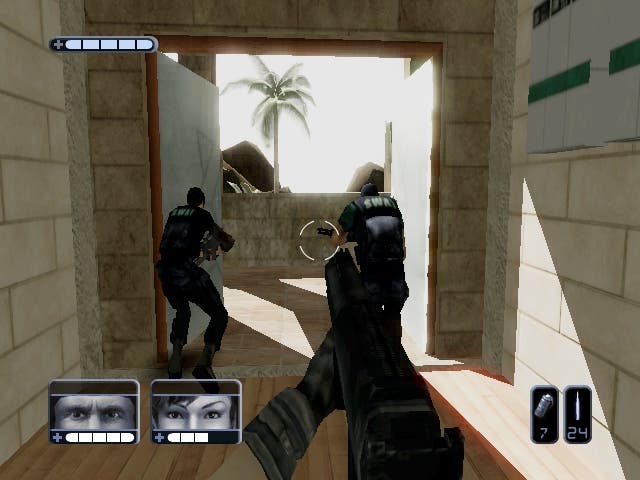
Meanwhile, the rather gimmicky voice recognition is worth a mention. On both the PS2 and Xbox versions, plugging in a headset will enable you to bellow basic orders to your team, but while it works reasonably well with about a second delay, you'll soon realise that issuing the exact same commands via the D-pad is by far the quickest and most efficient way of doing things. Merely shouting "lock on" at a distant target over your headset might sound like a cunning idea, but the truth is there's nothing you can't already do with the intuitively mapped controls and the headset will quickly become a superfluous accessory if our experiences are anything to go by. Oddly team-mates regularly claim to have received a command even when you've not said anything. Hmmmm.
While the core gameplay is superb, and all these neat are ideas are doubtlessly excellent and innovative, the feeling of being able to clear every single level with the minimum of effort leaves you unsatisfied, and cursing "is that it?" every time. Playing it on hard doesn't exactly solve the problem either. All that introduces is docking two bars off your health, rather than making the game feel any harder - although we'd certainly advise anyone playing this for the first time to go for hard if they want the game to last more than a few hours.
The rather pointless Time Attack mode adds a distinct arcade feel to the proceedings, and makes fire fights rather more frenetic than they would be for forcing you to blitz through the level while a clock ticks down, but in all other respects it's just the same campaign mode. It's certainly a challenge, but after playing through the game once there's little incentive to do it all over again for the sake of it. Elsewhere, the co-op alternatives for both main modes are a nice touch and, Deathmatch is exactly what you expect, but none of them are more than sideshow distractions and can hardly be expected to occupy you for too long. Still, it's better to have them than not.
I'm uninspired
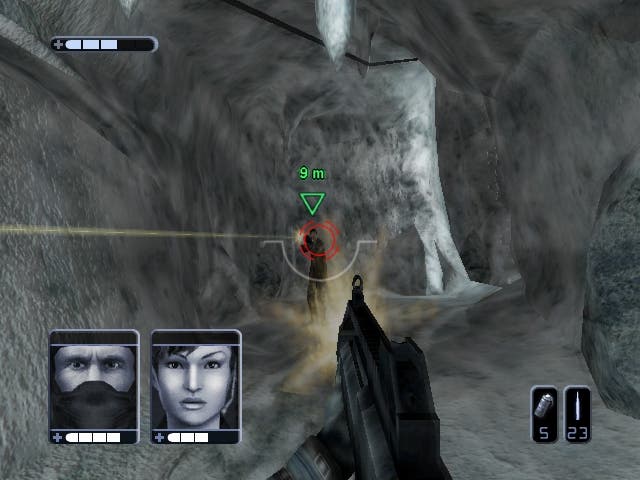
What also comes as a desperate disappointment is the overall standard of the visuals. The PS2 version in particular suffers from uninspired linear environments with bland texturing and an absence of any of the modern lighting and particle effects to draw you in. The Xbox version is far better, with much crisper environments with some nice bump mapping to bring everything to life, and some noticeable improvements in the lighting, but it still looked dated in the main. Compounding the effect - for both versions - are some of the most generic baddies ever to populate a modern FPS, with an embarrassing level of facial detail, awkward angular bodies, less than convincing animation and some rudimentary scripted AI routines that always give you a decent chance of picking them off; if not on the first go, then certainly the one after.
Occasionally they lob the odd flash bang or pop out from a hiding place you didn't check out, but they never patrol an area or group together to take you out as you'd expect they would in a real-life situation. In the main, all the game ever does is throw enemies at you in groups of three, and leaves it at that. New guards spawn every time you've performed a task, so very quickly you realise they're going to come running in your direction and take them out accordingly. And if you don't spot them, your buddies will, so it doesn't take long to power through this fairly predictable procession.
Things do ramp up as you approach the finishing line, but I can only recall one level clocking in at more than 20 minutes. The 20th level, for example, took us less than seven minutes on our first go with no continues, and this was by no means an exception. Another issue is the lack of variety in your missions. It's almost always "rescue so and so" or "explore area A" with the inevitable button to press or computer to hack at the end of it. It hardly breaks the mould, put it that way.
Easy tiger
Nevertheless, despite the crushing averageness that SWAT displays in the visuals and the by the numbers level design, it's a strange experience to reflect on how much we enjoyed it. Was that because we were rarely frustrated and could just play all the way to the end? Possibly, but we'll almost certainly never go back to it, so that's not a selling point. Closer to the mark is the superb control system that makes fire fights much more enjoyable, combined with the addictive reward mechanic that had us cuffing everyone in sight, trying to earn all those medals on offer. In a sense, this reward system and the speed with which you can plough through each level does lend a perverse degree of replayability to SWAT, but you still can't help feel a bit cheated that Argonaut didn't go all out in creating something special.
The truth is, most people won't even find out what SWAT has to offer - they'll take one look at the dreadful visuals and decide on the spot that there are better things to spend their money on, which is a fate Global Strike Team doesn't deserve. With a decent graphics engine, a sterner challenge and some polished AI routines, this could've been a classic, but as it stands it's another near miss that few people will ever get to play.

